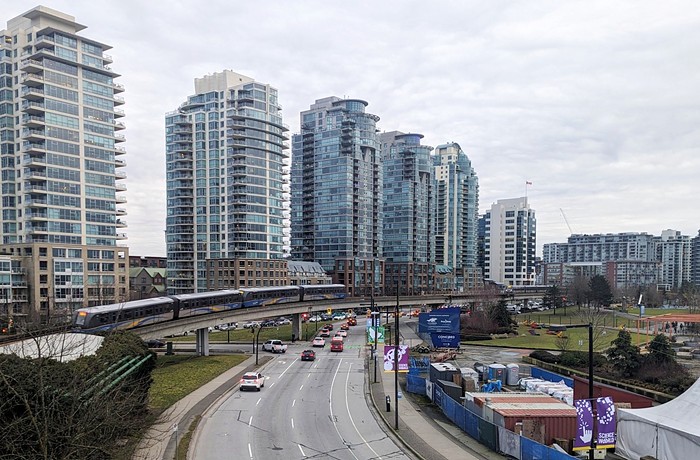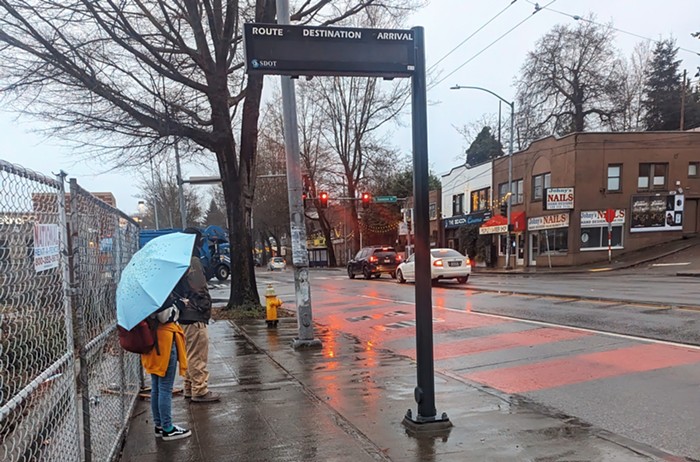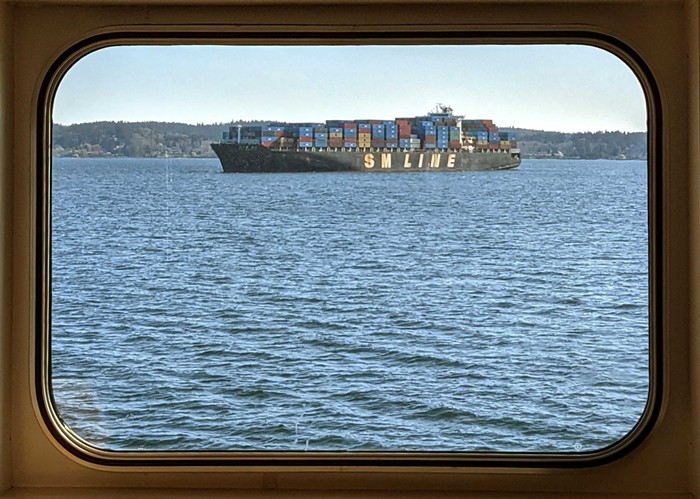Transportation
Mar 28, 2024 at 10:00 am
To Be Fair, No American Bridges Are Built for 21st Century Capitalism
The supply chain at sea.
Charles Mudede
Comments
Please wait...
Comments are closed.
Commenting on this item is available only to members of the site. You can sign in here or create an account here.




















There's a case to be made for just not rebuilding this bridge. It's part of the outer freeway ring of Baltimore, I-695. Maybe better to add more lanes to I-895.
But what do I know. I voted for Cary Moon.
It is very difficult to impossible to design a bridge to withstand a ship strike. The goal should be to put systems in place to keep the ship from hitting the bridge in the first place. Escort tugs to steer the ship if it loses power are a well-proven system for doing just that.
Charles, the more you know about world merchant shipping, the more appalled you would be.
Pompeii wasn’t built to withstand a volcanic eruption. The Titanic wasn’t built to withstand the first 5 compartments flooding. The Banqiao dam in China wasn’t built to withstand a typhoon. The Hood Canal Bridge wasn’t built to withstand the extreme winds in 1979. The Twin Towers weren’t built to withstand plane collisions larger than 707s.
Not every disaster is the fault of the underlying economic system of the time, nor everything else that happens, for that matter.
I envy anyone whose job allows them to cast about phrases like “containerization of the economy” before lunchtime.
A perfect world has no big ships, no bridges, and no monetary economy as we know it. Humans are terrible for the planet regardless of what economic team they play for, let’s not pretend otherwise (see also China, USSR and other socialists track record on the environment).
Oh, I-895 is a tunnel under the river. So, not adding lanes there.
My Urbanist fantasies will fall on deaf ears. Freeways forever!
Wouldn't it be easier to say that anything designed in the past is probably ill prepared for the future? Not much fun in that though.
@2, The cost of the tugs quickly outstrips the costs of the wrongful death claims to a rush hour packed bridge full of people, the cost of replacing the bridge, many times over.
Why would shipping companies, and their insurers, pay a cost of tugs, that is many times higher than the maximum cost that a court would ever require them to pay in the wake of a repeat accident?
The cost of the tugs are four or five figures per trip, multiple trips per day, to prevent an accident that occurs once every 45 years. It never pencils out.
@7 Why would shipping companies pay for it? Because the port, state, or feds makes a rule that says they have to. The shipping companies won't ever do it on their own, sure. Doesn't mean the regulators or legislators can't get involved. If you want to deliver to that port, you pay for the ship assist tugs you're already hiring to escort the ship past the bridge(s). And before you gripe about added costs to the consumer, consider economies of scale. A $25K bill for escort services would add about $2.50 per container load of stuff on board. That's utterly insignificant in the grander scheme of consumer prices.
Escort tugs are required for tankers going in and out of Prince William Sound, San Francisco Bay, and North Puget Sound, among other places. That didn't happen out of the generosity of ship owners or insurers' fear of paying out for another Exxon Valdez. It was because of federal and state law.
In the Port of Tacoma there are several waterways that run parallel to the Puyallup River. They are quite narrow and ships towed in have a tug up forward and a tractor tug tethered to the stern of the ship facing aft. Should the forward tug loser power the tractor tug stars pulling aft of the ship in a braking action. It's not a perfect system but it probably would have worked in Baltimore.
This is such an ignorant and stupid column. “No bridges” are built for container ships? You live in Seattle, Charles. Look out your window at the West Seattle Bridge.
@8, So then the shipping companies will just go to other ports. So then they make it a nationwide rule, then the ports without bridges and other obstacles get competitive advantages over ports that don't, as well as ports like Prince Rupert, BC, Vancouver, BC, etc. I can see all kinds of efforts by a coalition of the "have not" port reps and senators that lose out to repeal the requirement.
Further, why would the public want to pay the higher costs for goods and services resulting from tugs to avoid a low-frequency, high-cost event, when they can pay less for the low-frequency, high-cost event?
If you are a home owner, and your house is pre-1979, have you paid to earthquake retro-fit it? Have you gotten that earthquake insurance policy? There is a 9.0 earthquake coming for certain. If you are a renter, do you have a renter's insurance policy for that low-probability, high-consequence claim? If you are a renter or home owner, is your earthquake kit at home and office complete and up to date, including everything you need to hike home from the office? Taken a free Seattle Office of Emergency Management Earthquake Prepardeness Class? If you live outside of Seattle, taken a FEMA CERT class that everyone (other than Seattle - Seattle thinks they know better) else uses? If not, why not?
I'll answer for you. As a species, we don't do well preparing for a speculative threat at an uncertain point in the future, or even a known threat, at an uncertain point in the future. Why would you expect the public as a whole to behave any differently than you do individually toward your earthquake risk.
Tankers are a different matter. There is an environmental component, not just an economic one.
Even then we still didn't require escorts in all the cases you mention until the damage was already done. Even now, we don't require them west of Port Angeles, and tankers going to Canadian refineries, transiting the same waters don't require them and can't be required to use them.
Even when there is an environmental component, we do a crappy job of assessing and mitigating risk. We shun nuclear as a source because of visceral accidents and images such as Chernobyl, Three Mile Island, and Fukushima. Yet they have less deaths per unit of energy than any energy source other than solar (and they are so close its a virtual tie), and fewer greenhouse gas emissions than any other source, including solar. https://ourworldindata.org/safest-sources-of-energy
@11 You're not listening. The marginal costs per container or ton of coal are insignificant. Let's just look at a port call for a ship the size of the Dali, as it stand now. 950 feet, 52,000 net tons, 95,000 gross tons, 5,000 40' containers (10K TEU), ~100,000 tons of cargo.
Port fees: $120K to move inbound containers off the ship, another $60-$90K to load outbound cargo on. Add another $8K for the privilege of using the dock. And another $250K to get the containers out of the terminal on rail cars ($10/car, 2 containers/car, 5K containers). So we're up around $450K to the port.
That makes the tug charges of $9.5K (2 tugs, $4750 each) seem positively cheap. Even if the escort service added $20K like it does in North Puget Sound, it would be a drop in the bucket next to the port fees. Since the transits through the Chesapeake Bay bridges (25-30 miles) are shorter than the transits from Anacortes to Port Angeles (50 miles), they'd probably be cheaper over there.
https://mpa.maryland.gov/Documents/MPAScheduleNo23.pdf
https://assets.ctfassets.net/l47fhzirj3ln/3VxzaYmC3jAqo5dG5hhCZo/90a4fdad33acd8a50e83e8c05437126c/baltimore-tariff-mcallister.pdf
So shippers will want to go to other ports? Good luck finding one that has capacity. And yes, humans are great at ignoring future potential costs. They are also really good at responding to the latest big thing right in front of them. And looky here, we've got a big catastrophe in front of us with an obvious solution!
@8, This will drive you crazy.
Everyone with business interruption losses from the Port being blocked is shit out of luck by Supreme Court precedent from the 1920's.
The ship owner is only liable for damage to the bridge, up to the value of the ship, per Maritime Law.
https://www.cnn.com/2024/03/28/business/who-ends-upholdingthebagfor-the-baltimore-bridge-collapse/index.html
@13 You are conflating two different concepts.
The Limitation of Liability Act of 1851 allows vessel owners to limit liability to the post-casualty value of the vessel (provided certain conditions are met). This applies to a wide variety of claims, not just those for economic loss due to business interruption. This should be obvious, but to clarify: legislation from 1851 is not "Supreme Court precedent from the 1920's."
The Supreme Court precedent you mentioned is a completely separate issue. Under Robins Dry Dock and its progeny, a party cannot recover for economic loss unless it also suffered some physical damage to its property. So, for instance, if the bridge was a toll bridge, the the bridge owner/operator could recover for the loss of toll revenue, because the bridge itself was damaged. But the port facilities and vessels stuck behind the bridge, which did not sustain any physical damage, cannot recover economic losses.
@13 As usual, when proven wrong you just swing on over to another hobby horse that you don’t really understand. Hint: unless you’re an admiralty lawyer, you don’t know how it works. The people that the networks have opining on issues are regularly wrong.
And why would you think that would drive me crazy? I’ve never expressed an opinion one way or the other about who ought to pay.
@12, And they respond to the thing right in front of them, and they respond because its right in front of them, not because of any rational risk assessment, cost benefit analysis or just a subjective assessment that it just isn't worth it.
Let's say you get what you want. Tugs are required. At some point in the future, both the ship's power will fail, and the tugs power will fail simultaneously, people will die, and it will cost billions. It will be far more rare, but it will happen. Do we then decide on a double-tug escort? So at what point do we decide the juice isn't worth the squeeze? The cost of prevention isn't worth the harm prevented? Hadn't we already decided that? Hence the fact that this ship did not a have a tug escort.
Both Seattle and Tacoma have unused capacity. Yet we lose out to other ports other ports over small marginal cost differences, or just don't get the business of at capacity ports that are cheaper. Portland has capacity, but hasn't run containers in years.
At a certain price point, certain discretionary goods just don't move any more, things get re-shored, people by other goods. There are winners and losers. If you are the Congressional delegation from Baltimore, you make sure your folks are winners, not losers, over those marginal differences. If you are the longshore union, you howl loudly to local Congressman X's electorate if your members are losers. It's a feature of democracy, not a bug.
@17 You continue to illustrate exactly how little you know about the topic. First of all, the standard for escort tugs is two tugs per ship anyway. Second, tugs have been escorting ships for a significant period of time. Go ahead and find out how often escort tugs have lost ships on to the beach.
On to ports. And you’re not getting any more knowledgeable. You’re missing the fact that ports aren’t fungible. Baltimore imports a lot of the cars that arrive in the US from Europe. How exactly do those shippers decide to switch to Seattle or Tacoma? Ship them three quarters of the way around the world? The rest of the East Coast is struggling to figure out how they’ll manage the cargo coming in while the port of Baltimore is down. They’re going to be working overtime, which means it’s more expensive. So when Baltimore reopens, they’ll be cheaper than the other alternatives even if they require escort tugs. You’ll notice that most of the costs above are due to cargo handling. Overtime would add big bucks.
And your economic analysis doesn’t get any better. Just after reminding everyone that the ports and other taxpayers are likely to be on the hook for much of the 1-3 billion in damages, you say that it’s too expensive to add $20K to a transit to prevent the losses. Of course, the cost of the accident is worth 50,000 or so ship visits. How long would that take to pay off?
If you want to show that you know something instead of just flinging FUD like a capuchin monkey throws shit, go ahead and find out what East Coast ports have capacity for the cargoes shipped through Baltimore. And what their rates are. And how much it would change shipping costs on the US end to go to that port. You see, Baltimore is the closest port to the upper Midwest. Sending that cargo through, say, Savannah would add hundreds of miles of travel time and far more money than the $4/container that adding escort tugs would.
@18, It isn't just that one bridge. It's a 160 mile long seaway with three bridges (begining, midpoint, and end). At 10 knots, that's 16 hours, times two tugs, at $1,100 per hour each $2,200 per hour, each way. Call it$74,000 per trip.
Then you have all of the other ports with bridges obstructing them. Why are those any less worth of protection.
My point about Seattle Tacoma, is you have the same issue on the East Coast. Portland, ME is under-utilized. In the extremely short-run are they fungible? Nope. But small marginal changes and either the shipping volume goes away or it goes elsewhere.
Kobe Japan's Port went down in 1995 from an Earthquake. The infrastructure was repaired in two years. The shipping volume as of 2011 still was 85% of 1994 levels. To woo the traffic back, the port would have to sign contracts at deep operating losses for half a decade or more.
Nor is there any assurance that tugs would have been able steer the ship clear of a collision with the bridge anyway according to the maritime experts interviewed at the link.
I googled, "calls for tug escorts baltimore" to test your hypothesis that the public has a huge appetite for the mandate you suggest. That is how I found the link. It was the one, and only link even exploring the idea. So six lives and $3.5 billion in losses later, and the public, at least so far, seems to be going "meh".
https://www.usatoday.com/story/news/investigations/2024/03/27/tugboats-baltimore-key-bridge-disaster/73123627007/
https://www.google.com/search?client=firefox-b-1-d&q=calls+for+tug+escorts+baltimore
Can we all agree now that these columns are being written by a satirical bot?
@19 You just can't help being wrong. In detail and in the big picture. Wrongity wrongity wrong.
For starters, there are three bridges, but two are quite close together (~25 miles from the berth), and the third is far down at the mouth of the Chesapeake. Any reasonable tug company (and I know McAllister is reasonable--I've worked with them) would station one pair of tugs at the mouth and another pair at the port, Total escorted distance would be less than 50 miles, or less than the distance escorted in North Puget Sound. And that's if Virginia decides to require escorts at the mouth. It's a much simpler bridge carrying much less traffic, so they could quite reasonably decide it's a low risk.
OK, so a shipping company decides to move to Portland ME to avoid $4/container in extra fees due to escort tug requirements. Then they're paying to move those containers 400 miles further than Baltimore to get to the Upper Midwest. And they'll spend at least $100 more on train fees. What rational business would spend $100 to save $4? You just don't get how transportation networks work.
Kobe is apples and kumquats. The port of Baltimore isn't destroyed. It will be back up and running at near full capacity in 2-3 months when the bridge wreckage is removed. It's far easier to come back from a short term disruption than a long term one.
You sure have some selective reading. In the USA Today article you linked, the master mariner who works as a professor in maritime business said that tugs would work and should be required. the merchant mariner (hint, not master), historian, and Youtuber says maybe it wouldn't. Which one sounds like they know more to you? Also, the Youtuber says that the tugs can't stop ships, and implies that they can't maneuver them either. If that's the case, how do tugs get ships into the dock? Hint: he's wrong. And you can tell because tug companies do full scale escort exercises all the time.
As for public officials calling for tugs, I'm afraid you're going to have to wait. They'll at least wait until NTSB issues a preliminary set of facts in a week or two. They might wait until the full report is out in a year or a blue ribbon commission issues findings after that. Right now, they're focused on immediate recovery of the remaining bodies and of port operations. You know, as they should be.
@21, One of my jobs, in a past life, was to spot trans-pacific log carrying ships docking at the Port of Port Angeles. I.e. The Port owned the dock, and my job, when the Marine Manager was not available, was to be on the radio with the Master and/or Pilot and tell them where I wanted the ship spotted on the Port's dock. My job was also to document the damage to the dock when the master and/or pilot giving orders to the two tugs f-d it up and damaged our dock. There was a five or six figure incident at least once per year, at a low volume port, with ships 1/4 the GWT of the ship in question, with two tugs assisting in the docking. I'd tell them to bring it forward so the bow was at the water truck, or some other bigish landmark the master could see, and tell him 1/2 there, 3/4 there, etc. as he came, or yards to go (whatever he preferred)
He (or she) would give orders over the radio to the tugs, the water would churn furiously, and 15 to 30 seconds later that ship would start to move. Stopping that much weight had similar issues and delays. That was in relative shelter, relative calm, and with little current, at speeds of less than 3 knots.
The biggest issue is the math on the money doesn't work.
Let's assume we could cut the cost of tug escort in half with tugs only escorting at the bridges. That's a doubtful assumption, because doing so increases capital costs dramatically for more tugs (that gets amortized into the hourly rate, over fewer hours of operation), as well as the more minor operating costs for more additional moorage fees, crews on stand-by, number of crews on duty, etc. even if actual hours of escorting are diminished. Even though the assumption is doubtful, will go with it. Some money would be saved, but half?
So let's assume its $35,000 per ship escorted into the Port of Baltimore, through the three bridges, by two tugs, at each bridge.
The Port of Baltimore receives 1,800 ships per year. 1,800 x $35,000 = $63,000,000 a year in additional tug costs. The future value of that in 25 years, at 7% interest (which is less than the historical return of the S & P 500 over 25 years) is $3.9 billion. That's more than the projected cost of replacing the bridge that got wiped out every 25 years.
But it gets worse. You also have the Port of Norfolk (commercial), and the U.S. Navy Base at Norfolk, with a least two bridges to contend with. The escort time there is less, because they are much closer to the bridges and the bridges are closer together. But it doesn't matter what the marginal add is, because you have already spent more, on the installment plan, avoiding replacing a bridge every 25 years, than the cost of replacing a $3.5 billion bridge.
By the time the NTSB issues even preliminary findings, the six Central American immigrants on the construction crew that died on the bridge will have had funerals mentioned a few times in a 24 hour news cycle. There won't be marches in the street over the injustice of their death. The NTSB's recommendation for tug escorts through bridges, if any, will quietly die, particularly since the regulatory authority that would mandate such a thing, unlike say the FAA in aviation, is diffuse across at least three different entities, one of which is the Port of Baltimore, which only has local authority.
@4 Capitalism is not a Natural Disaster. It is man-made.
I could tell this would be another unhinged Mudede rant before I even opened the article lmao so predictable
@24 me too. Been reading TS so long I can tell Mudede articles just from the title. And all read: capitalism sucks. Amazing he's able to monetize that obsession for so many years.
@4: “The Twin Towers weren’t built to withstand plane collisions larger than 707s.
“Not every disaster is the fault of the underlying economic system of the time, nor everything else that happens, for that matter.”
But to the very best of Charles’ knowledge, Marxist Socialist regimes never built overly huge, massively expensive engineering projects. :-D